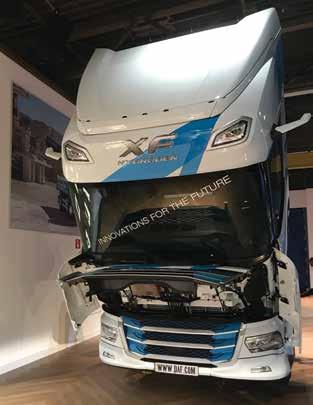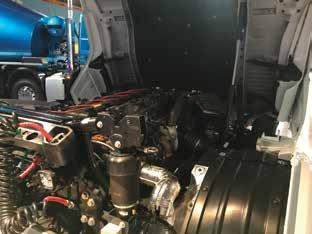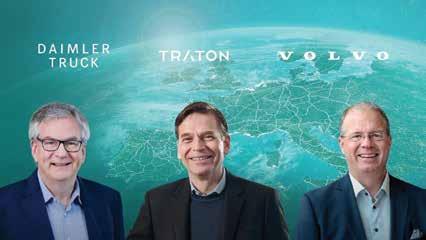
7 minute read
NEwS
“With the introduction of the New Generation DAF trucks, we now have a complete and very energy efficient platform for new generations of alternative energy carriers and drivelines. A great example is the new DAF XF H2 Innovation Truck prototype with hydrogen internal combustion engine which has been honoured with the International Truck of the Year (IToY) Truck Innovation Award 2022,” stated Ron Borsboom, Executive Director Product Development, DAF Trucks, discussing the Dutch brand’s strategy toward zero emission road transport.
“DAF’s philosophy is that we need to explore the full suite of technologies on the road of decarbonisation of road transport. Next to battery electric solutions which we already offer today and hybrid trucks which we have under development, hydrogen technology may become a very interesting option for the future. Hydrogen is certainly an option in the medium and long term for powering trucks. In fact, there are two different possibilities. A fuel cell that uses hydrogen to generate electricity to power the electric motor, or using hydrogen as a fuel for the combustion engine (ICE). In both cases, a 100% reduction in CO2 emissions can be realised if green hydrogen is applied,” he explained.
DAF Trucks, together with its parent company PACCAR in the United States, is taking on the development of both technologies, with DAF engineering the latter
DAF XF Hydrogen concept wins ‘IToY Truck Innovation Award 2022’
ICE option, while its Seattle counterparts work on the Fuel Cell variant. “If we want to achieve a real breakthrough with hydrogen technology in the future, it is essential that the first steps are taken now. And that is exactly what we are doing. Together with Toyota and Shell, PACCAR has started extensive trials with hydrogen-powered trucks with sophisticated fuel cell technology in the port of Los Angeles.”
“Compared to the fuel cell hydrogen solution, the combustion engine option has transient capabilities (eliminating the need for a large energy storage system). Other advantages include the lower cooling capabilities needed and lower sensitivity to hydrogen purity. Using hydrogen as a fuel means that in many areas use can be made of an existing distribution network: from green electric power generation to the location where it is needed. In addition, one should not forget that we in Europe have extensive knowledge and a comprehensive manufacturing footprint in the combustion engine technology. The European truck industry has commonly expressed the aim to refrain from using fossil fuels for their commercial vehicles as from 2040. Despite that, thanks to for instance hydrogen technology, the internal combustion engine still offers huge potential for the further future, especially in the heavy duty long haul transport segment.”
Ron also mentioned that the H2 ICE system is the lowest cost zero CO2 solution. The energy efficiency is comparable to FCEV for heavy-duty applications. Extra cooling is required but since there are no batteries required, rare earth sourced materials are saved. DAF collaborated with scientific research organisation TNO on the project, creating the demonstrator concept vehicle to increase the knowledge base and to determine the next development steps. These include further lowering emissions by combining SCR/H2 (with AdBlue) during combustion and thereby meeting Euro 7 engine emission targets. The award winning hydrogen powered tractor-unit carries four H2 fuel tanks, each having a 10kg capacity @350bar. *The Truck Innovation Award is an initiative of the International Truck of the Year (IToY) jury and acknowledges new, promising technological developments which can play a crucial role in a sustainable future in the commercial vehicle sector. The IToY jury praised the handling characteristics, seamless acceleration and user-friendly human machine interface (HMI) of the prototype.
The ITOY journalists appreciated DAF Truck’s innovative approach to alternative propulsion and energy transition, which takes advantage of the dynamic qualities of the internal
combustion engine while ensuring zero CO2 emissions from the tailpipe. In this perspective, the jury believes that innovative hydrogen combustion solutions could play an important role by harnessing established technologies and supply chains. They can be an additional component of an OEM’s future powertrain portfolios, alongside BatteryElectric Vehicles (BEVs) and Fuel Cell Electric Vehicles (FCEVs).


Truck brands sign joint venture agreement for European high-performance charging network
Following lengthy negotiations, leading commercial vehicle manufacturers Daimler Truck, the Traton Group (Scania & MAN) and Volvo Group have entered a joint venture (JV) to install and operate a high-performance public charging network for battery electric, heavy-duty long-haul trucks and coaches across Europe. As previously reported, the parties are committed to initiating and accelerating the necessary build-up of charging infrastructure for the increasing number of customers of electric vehicles in Europe and contribute to climate-neutral transportation in the region by 2050.
Scheduled to start operations this year, the parties are collectively committed to invest €500 million, in order to install and operate at least 1,700 high-performance green energy charging points on and close to highways as well as at logistic and destination points within five years. The JV is planned to operate under its own corporate identity and be based in Amsterdam, Netherlands. The programme aims to help the European Union’s Green Deal for carbon-neutral freight transportation 2050 initiative - by providing the necessary infrastructure and targeting green energy at the charging points. High-performance charging infrastructure enabling long-haul truck transport is a cost-efficient way towards significant, fast-to-realise emission reductions.
This project is a significant start and an accelerator to make CO2-neutral heavy trucks and coaches a success, according to Martin Daum, CEO Daimler Truck: “The signing announcement is great news for the transport industry and society, as it underlines all of the partners’ strong commitment to making CO2-neutral trucks a reality. It is remarkable that three fierce competitors in the area of trucks and vehicle technology are taking action together to start establishing the needed charging infrastructure. Together with Volvo Group and the TRATON GROUP, we want to send a clear signal to all relevant stakeholders to follow our lead and act now.”
Christian Levin, CEO TRATON GROUP also commented: “We have the strong opinion that we as the TRATON GROUP together with our brands Scania and MAN as well as the commercial vehicle industry as a whole will be part of the solution when it comes to a CO2-neutral world. A collaboration with strong competitors like Daimler Truck and Volvo Group might seem unusual. However, the topic is of crucial importance and this unique cooperation will make us faster and more successful in delivering the transformational action needed to tackle climate change. Our joint venture will be a strong push for the rapid breakthrough of battery electric trucks and coaches, the most efficient and sustainable transport solutions.”
Martin Lundstedt, President & CEO Volvo Group, added: “We are going from words to action, and this planned joint venture with Daimler Truck and the TRATON GROUP is an important step in shaping a world we want to live in. Innovative partnerships like these will enable the much-needed change that will benefit our customers - and the entire industry. This is both a historical milestone in the transformation towards fossil-free transport and a breakthrough that shows Volvo Group’s commitment to reaching net-zero greenhouse gas emissions by 2040 and a net-zero emissions rolling fleet by 2050 at the latest.”
The three partners see this as a breakthrough for the transport industry to cut carbon emissions - and for other industries to benefit in several ways. A recent industry report is calling for up to 15,000 high-performance public and destination charging points by no later than 2025, and up to 50,000 high-performance charging points by no later than 2030. Therefore, this kick-start is a call for action to all other industry players, as well as Governments and policy makers, to work together for a rapid expansion of the necessary charging network to be able to contribute to reaching the climate targets. As a clear signal towards all stakeholders, the charging network of the three parties will be open and accessible to all commercial vehicles in Europe, regardless of brand.
By focusing on customers’ needs, different applications will be taken into consideration. Battery electric vehicle fleet operators will be able to leverage both fast charging tailored to the 45-minute mandatory rest period in Europe focusing on long-distance transport - the highest priority of the future JV - and also overnight charging.






